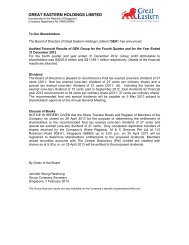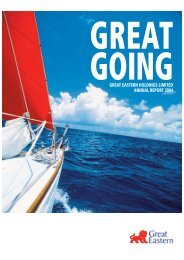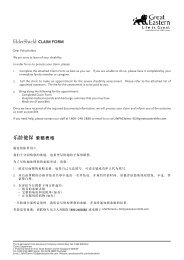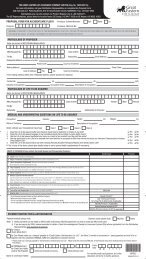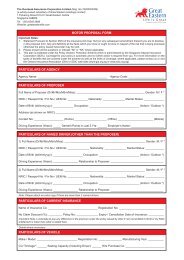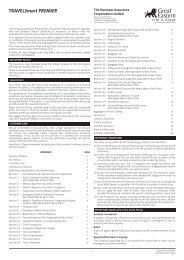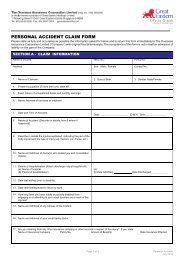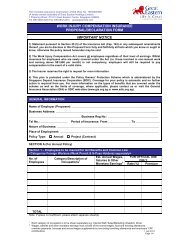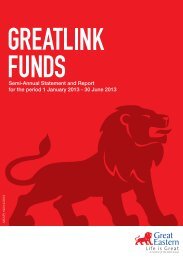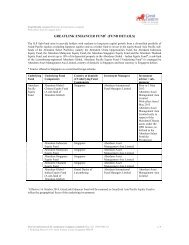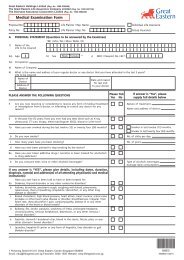09 GreatLink Global Technology Fund v19 - Great Eastern Life
09 GreatLink Global Technology Fund v19 - Great Eastern Life
09 GreatLink Global Technology Fund v19 - Great Eastern Life
You also want an ePaper? Increase the reach of your titles
YUMPU automatically turns print PDFs into web optimized ePapers that Google loves.
<strong>Fund</strong> Details version 23 (Errors & Omissions excepted)<br />
With effect from 1 November 2014<br />
GREATLINK GLOBAL TECHNOLOGY FUND (FUND DETAILS)<br />
The objective of the ILP Sub-<strong>Fund</strong> is to achieve long-term capital growth through investment in global technology<br />
stocks. It offers exposure to the rapidly growing adoption of technology across economies worldwide. Specifically, it<br />
aims to achieve high returns by investing in technology companies as well as in a range of industries where the growth<br />
opportunities have been impacted by technological developments.<br />
FUND FACTS (as at 31 August 2014)<br />
Currency<br />
Singapore Dollar<br />
Valuation Frequency<br />
Daily<br />
<strong>Fund</strong> Manager<br />
Lion <strong>Global</strong> Investors Limited*<br />
Sub Manager<br />
Wellington International Management Company Pte Ltd<br />
Country of Domicile<br />
Singapore<br />
Inception Date 15 January 2001<br />
<strong>Fund</strong> Management Fee (p.a.)<br />
1.60% (3.25% max)<br />
Custodian Fee (p.a.) 0.012%<br />
Trustee Fee (p.a.)<br />
N.A.<br />
<strong>Fund</strong> Structure<br />
Single <strong>Fund</strong><br />
<strong>Fund</strong> Size<br />
$66.538 million<br />
CPFIS Included<br />
CPFIS-OA<br />
Risk Category<br />
Higher Risk – Narrowly Focused<br />
*Previously known as Lion Capital Management Limited. The new name takes effect from 2 June 2008.<br />
The Sub Manager commenced managing this ILP Sub-<strong>Fund</strong> from 1 November 2006.<br />
PAST PERFORMANCE (as at 31 August 2014)<br />
Annualized Returns (%) 1 year 3 years 5 years 10 years Since Inception<br />
<strong><strong>Great</strong>Link</strong> <strong>Global</strong><br />
<strong>Technology</strong> <strong>Fund</strong><br />
31.61 23.40 14.83 6.11 -2.89<br />
Benchmark* 28.10 20.44 11.50 5.65 -0.76<br />
* Since inception till 28 February 2003: benchmark was MSCI World IT Index.<br />
From 1 March 2003 till 31 October 2006: benchmark was MSCI AC World IT Index (Gross).<br />
With effect from 1 November 2006, benchmark is MSCI AC World IT Free (Net).<br />
The change in benchmark is to better reflect the actual investments of the ILP Sub-<strong>Fund</strong>.<br />
Source: Morningstar<br />
Performance (%) indicated above is on bid−bid basis, with all dividends and distributions reinvested, taking into<br />
account all charges which would have been payable upon such reinvestment.<br />
The performance of the ILP Sub-<strong>Fund</strong> is not guaranteed and the value of investments and income from them may fall as<br />
well as rise. Past performance is not necessarily indicative of future performance.<br />
Fees and charges payable through deduction of premiums or cancellation of units are excluded from performance<br />
calculation.<br />
INVESTMENT APPROACH<br />
The approach to technology sector investing is based on analyzing the competitive outlook for various sub-sectors of<br />
the technology industry, identifying those sub-sectors likely to benefit from the current and expected future<br />
environment, and identifying individual opportunities within each sub-sector.<br />
Asset allocation within the portfolio reflects the relative attractiveness of stocks within the sub-sectors, near-term<br />
macroeconomic events that may detract or enhance the group’s attractiveness, and the number of undervalued<br />
opportunities in each sub-sector.<br />
Opportunities dictate the magnitude and frequency of changes in asset allocation among technology sub-industries, but<br />
The <strong>Great</strong> <strong>Eastern</strong> <strong>Life</strong> Assurance Company Limited (Reg. No. 1908 00011G) 1/6<br />
1 Pickering Street #13-01 <strong>Great</strong> <strong>Eastern</strong> Centre Singapore 048659
some representation typically is maintained in each major group to avoid excessive concentration. Allocation decisions<br />
are made collectively by the Sub Manager’s investment team.<br />
The evaluation of technology companies rests on the solid knowledge of the overall competitive environment including<br />
supply and demand characteristics, secular trends, existing product evaluations, and new product developments. The<br />
central theme is that less than efficiently-priced stocks can be found through extensive fundamental research. By<br />
focusing on early identification of the factors that lead to earnings revisions, fund manager is able to determine<br />
favorable investment opportunities not yet recognized in the market.<br />
The primary research is focused on direct contact with company management, suppliers, and competitors. External<br />
sources, including “Street” research, are primarily used for comparative purposes.<br />
The investment approach is opportunistic. After identifying a potentially attractive company, the analyst examines how<br />
the stock has been valued historically against “Street” consensus estimates during various market environments (e.g.,<br />
accelerating and decelerating earnings momentum, differing industry fundamentals). This comparison helps determine<br />
whether the fundamental change is already in the price. The fund manager then calculates the range of potential future<br />
earnings outcomes resulting from the change, identifying the most compelling investment cases for inclusion in the<br />
portfolio.<br />
While technology companies tend to have high growth rates, their varying earnings visibility and cyclicality cause their<br />
stocks to carry a range of valuations spanning both the growth and value spectrums. Security selection decisions are<br />
based on in-depth fundamental analysis and valuation.<br />
INFORMATION ON THE MANAGER<br />
Lion <strong>Global</strong> Investors Limited<br />
One of the largest asset managers in Southeast Asia, Lion <strong>Global</strong> Investors' (LGI) core competency is in managing<br />
Asian equities and fixed income on behalf of institutional and retail investors worldwide. At end of 30 June 2014, LGI<br />
is managing S$32.2 billion (US$25.8billion) on behalf of their clients globally.<br />
LGI’s investment capabilities, strong parentage and in-depth knowledge of Asian markets have contributed to their<br />
significant presence in Asia for over 27 years. This and being headquartered in Singapore - widely recognised as Asia’s<br />
leading financial hub – make LGI the preferred investment partner in Asia for international investors.<br />
Source: Lion <strong>Global</strong> Investors Limited<br />
Wellington International Management Company Private Limited (“Wellington”)<br />
Wellington Management is a fully-integrated global organization comprised of the parent entity, Wellington<br />
Management Company, LLP and its affiliates, including Wellington International Management Company Pte Ltd, its<br />
Singapore-based affiliate.<br />
With US$904 billion in assets under management, Wellington Management serves as an investment advisor to more<br />
than 2,100 clients based in more than 50 countries, as of 30 June 2014. Wellington’s singular focus is investments —<br />
from global equities and fixed income to currencies and commodities. They like to describe themselves as a community<br />
of teams that create solutions designed to respond to specific client needs. Their most distinctive strength is their<br />
proprietary, independent research, which is shared across all areas of the organization and used only for managing<br />
clients' portfolios.<br />
Tracing its roots to the founding of Wellington <strong>Fund</strong> in 1928, the firm is based in Boston, Massachusetts, and also has<br />
offices in Chicago, Illinois; Radnor, Pennsylvania; San Francisco, California; Frankfurt; Beijing; Hong Kong; London;<br />
Singapore; Sydney; Tokyo and Zurich.<br />
Source: Wellington International Management Company Pte Ltd<br />
Investors should note that the past performance of the Managers is not necessarily indicative of the future performance<br />
of the Managers.<br />
The <strong>Great</strong> <strong>Eastern</strong> <strong>Life</strong> Assurance Company Limited (Reg. No. 1908 00011G) 2/6<br />
1 Pickering Street #13-01 <strong>Great</strong> <strong>Eastern</strong> Centre Singapore 048659
SOFT DOLLAR COMMISSIONS OR ARRANGEMENTS<br />
Lion <strong>Global</strong> Investors Limited<br />
The Manager receives and enters into soft dollar commissions or arrangements used to support investment decision<br />
making and these include research and advisory services, economic and political analyses, portfolio analyses, data and<br />
quotation services and computer hardware and software.<br />
The Manager only accepts or enters into soft dollar commissions or arrangements if such soft dollar commissions or<br />
arrangements shall, in the opinion of the Manager, reasonably assist them in the management of the ILP Sub-<strong>Fund</strong>, and<br />
further shall ensure at all times that such transactions are executed on the best available terms taking into account the<br />
relevant market at the time for transactions of the kind and size concerned and that no unnecessary trades are entered<br />
into in order to qualify for such soft-dollar commissions or arrangements.<br />
Wellington International Management Company Private Limited<br />
Wellington Management investment professionals can and do use research produced outside of their firm in their<br />
decision making process (“Research Services”). These Research Services are of high intellectual content and include<br />
written research material as well as access to industry experts and leaders in a variety of fields. Roughly 6% of<br />
Wellington Management's client commissions are used for the recognition of third-party Research Services paid via<br />
Client Commission Arrangements ("CCA") or "soft dollars". All Research Services obtained through their CCAs<br />
qualify as research or execution under the provisions of Section 28(e) of the United States Securities Exchange Act of<br />
1934 and the requirements of the FSA Rules and Guidance as set forth in Policy Statement 05/9 on bundled brokerage<br />
and soft commission arrangements. Wellington Management uses our primary trading relationships to establish CCAs.<br />
Their Policy and Procedures on Order Execution discusses their practices with respect to the receipt of research from<br />
brokers with whom Wellington Management places trades.<br />
Wellington Management requests broker/dealers to accrue cash balances for payment of qualified third-party research<br />
services through CCAs. These balances are generally not systematically linked to commissions generated by trades<br />
they place on behalf of their clients, but rather are managed in the aggregate across commissions generated by all<br />
clients. If a broker/dealer who pays for third-party research is used to execute CCA eligible trades in a client account,<br />
then they assign to each client account a pro rata share of the third-party research payment made by that broker/dealer.<br />
The account’s pro rata share for each broker is based on the percentage of aggregate firm wide commissions with each<br />
firm that are used for third-party research payment. Broker/dealers may implement this accrual process using various<br />
methods and assumptions that are not transparent to Wellington Management.<br />
Research Relationships and Broker Selection<br />
Transactions are placed with broker/dealers who, in the judgment of Trading, can provide best available price and most<br />
favorable execution at a commission rate negotiated based on the execution requirements of the trade. The trader<br />
considers the full range of brokerage services applicable to a particular transaction when making this judgment. In<br />
instances where the trader believes that more than one broker/dealer can offer the execution services needed to seek<br />
Best Execution for a particular order, the trader may consider the research services provided by a broker/dealer or<br />
client-directed (commission recapture) instructions as a deciding factor in the broker/dealer selection process. This<br />
unconstrained trading environment is an important benefit and advantage of their approach to client commission<br />
management.<br />
CONFLICTS OF INTEREST<br />
Lion <strong>Global</strong> Investors Limited<br />
The Manager is of the view they are not in a position of conflict in managing their other funds and the ILP Sub-<strong>Fund</strong> as<br />
each of the funds and the ILP Sub-<strong>Fund</strong> has its own investment universe, investment objectives and investment<br />
restrictions, separate and distinct from each of the other funds. In the event the various funds place orders for the same<br />
securities as the ILP Sub-<strong>Fund</strong>, the Manager shall endeavour as far as possible to allocate such securities among the<br />
funds in a fair manner based on a pro-rata basis.<br />
Associates of the Trustee may be engaged to provide financial, banking or brokerage services to the ILP Sub-<strong>Fund</strong> or<br />
buy, hold and deal in any investments, enter into contracts or other arrangements with the Trustee and make profits<br />
from these activities. Such services, where provided, and such activities, where entered into, will be on an arm’s length<br />
basis.<br />
The <strong>Great</strong> <strong>Eastern</strong> <strong>Life</strong> Assurance Company Limited (Reg. No. 1908 00011G) 3/6<br />
1 Pickering Street #13-01 <strong>Great</strong> <strong>Eastern</strong> Centre Singapore 048659
Wellington International Management Company Private Limited<br />
Wellington Management does not engage in retail brokerage, lending, securities underwriting, or proprietary trading<br />
and is not affiliated with any firms that engage in these businesses. In addition, the firm’s business model, ownership<br />
structure, and culture seek to align the interests of clients with those of the firm. Together, these structural elements<br />
help the firm avoid some of the most typical conflicts of interest in the investment management business, such as:<br />
• conflicts relating to an ownership relationship with another financial entity<br />
• conflicts involving trading for the profit of the firm versus the client<br />
• conflicts caused by business interest in a distribution entity<br />
• conflicts stemming from the use or sale of research to support other forms of business<br />
Still, the nature of the investment management business – and our firm’s diversification by client type and asset class –<br />
makes it virtually impossible for any firm to be immune from conflicts of interest altogether. Wellington has extensive<br />
policies and procedures for managing conflicts of interest that are described in their “Our Business and Practices”<br />
document.<br />
RISKS<br />
General Risks<br />
Investors should consider and satisfy themselves as to the risks of investing in an ILP Sub-<strong>Fund</strong>. Generally, some of the<br />
risk factors that should be considered by the investors are market, derivatives, liquidity, political, repatriation,<br />
regulatory, counterparty, currency, and emerging market risks.<br />
An investment in an ILP Sub-<strong>Fund</strong> is meant to produce returns over the long-term. Investors should not expect to<br />
obtain short-term gains from such investment.<br />
Investors should note that the value of units, and the income accruing to the units, may fall or rise and that investors<br />
may not get back their original investment.<br />
Specific Risks<br />
(a) Market Risks<br />
The usual risks of investing and participating in listed and unlisted securities apply. Prices of securities may go up or<br />
down in response to changes in economic conditions, interest rates, and the market's perception of securities. These<br />
may cause the price of units in the ILP Sub-<strong>Fund</strong> to go up or down as the price of units in the ILP Sub-<strong>Fund</strong> is based on<br />
the current market value of the investments of the ILP Sub-<strong>Fund</strong>.<br />
There are usual risks of investing in bonds and other fixed income securities. Bond prices may go up or down in<br />
response to interest rates with increases in interest rates leading to falling bond prices.<br />
The market prices of bonds and other fixed income securities are also affected by credit risks, such as risk of default by<br />
issuers and liquidity risk.<br />
(b) Derivatives Risks<br />
An ILP Sub-<strong>Fund</strong> may from time to time invest in derivatives, which are financial contracts whose value depend on, or<br />
is derived from, the value of an underlying asset, reference rate or index. Such assets, rates and indices may include<br />
bonds, shares, interest rates, currency exchange rates, bond indices and stock indices. While the judicious use of<br />
derivatives by professional investment managers can be beneficial, derivatives involve risks different from, and, in<br />
some cases, greater than, the risks presented by more traditional securities investments. Some of the risks associated<br />
with derivatives are market risk, management risk, credit risk, liquidity risk and leverage risk.<br />
The Sub Manager does not intend to use derivatives transactions for speculation or leverage but may use them for<br />
efficient portfolio management and risk management. Such investments will be made subject to a restriction that the<br />
total value of investments which are futures, options, forwards, swaps, collars, floors and other derivatives (excluding<br />
derivatives entered into for hedging purposes) shall not exceed 15% of the total value of each fund. The Sub Manager<br />
will attempt to minimize the risks through careful selection of reputable counterparties and constant monitoring of the<br />
derivatives positions.<br />
(c) Political Risks<br />
The political situation in the countries may have an effect on the value of the securities of companies in whose<br />
securities an ILP Sub-<strong>Fund</strong> has invested, which may in turn impact on the value of the units in the ILP Sub-<strong>Fund</strong>.<br />
The <strong>Great</strong> <strong>Eastern</strong> <strong>Life</strong> Assurance Company Limited (Reg. No. 1908 00011G) 4/6<br />
1 Pickering Street #13-01 <strong>Great</strong> <strong>Eastern</strong> Centre Singapore 048659
(d) Currency Risks<br />
As the investments of an ILP Sub-<strong>Fund</strong> may be denominated in foreign currencies, fluctuations of the exchange rates of<br />
foreign currencies against the base currency of an ILP Sub-<strong>Fund</strong> may affect the value of the units in the ILP Sub-<strong>Fund</strong>.<br />
The Sub Manager may from time to time employ currency hedging techniques to manage the impact of the exchange<br />
rate fluctuations on an ILP Sub-<strong>Fund</strong> and/or for the purpose of efficient portfolio management.<br />
(e) Risks associated with investments in countries outside Singapore, particularly in emerging markets:<br />
(i) Political Risks<br />
Countries outside Singapore, especially those with emerging markets, may be subject to higher than usual risks of<br />
political changes, government regulations, social instability or diplomatic developments (including war) which could<br />
adversely affect the economies of the relevant countries and thus the value of investments in those countries. There is<br />
also the risk that nationalization or other similar action could lead to confiscation of assets under which shareholders in<br />
those companies would get little or no compensation.<br />
The emerging economies may be heavily dependent on international trade and accordingly, may be adversely affected<br />
by trade barriers, or other protectionist measures and international economic developments generally.<br />
(ii) Liquidity Risks<br />
Trading volume on stock exchanges in emerging markets can be substantially less than on the stock exchanges of the<br />
major markets, so that acquisition and disposal of holdings may be time consuming and/or may need to be conducted at<br />
unfavorable prices.<br />
(iii) Repatriation Risks<br />
Investments in emerging markets could be adversely affected by delays in, or refusal to grant, relevant approvals for the<br />
repatriation of funds or by any official intervention affecting the process of settlement of transactions. Consents granted<br />
prior to investment being made in any particular country may be varied or revoked, and new restrictions may be<br />
imposed.<br />
(iv) Regulatory Risks<br />
An ILP Sub-<strong>Fund</strong>'s investments in emerging economies are also subject to regulatory risks, for example, the<br />
introduction of new laws, the imposition of exchange controls, the adoption of restrictive provisions by individual<br />
companies or where a limit on the holding of the ILP Sub-<strong>Fund</strong> in a particular company, sector or country by<br />
non−residents (individually or collectively) has been reached.<br />
(f) <strong>Technology</strong> related risks<br />
Focused investments into a specific sector as technology related companies are likely to be affected by factors<br />
associated with technology industries that may include regulatory restrictions, obsolescence due to technological<br />
advancements, development failure and unforeseen changes and costs to effective application of technology.<br />
(g) Concentration risks<br />
Investments into companies of almost similar businesses which may likely subject the ILP Sub-<strong>Fund</strong> to high risk when<br />
market and economic conditions are not favourable to the specific industry.<br />
The ILP Sub-<strong>Fund</strong> is also subject to the usual counterparty risks, such that the ability of the ILP Sub-<strong>Fund</strong> to make<br />
payments may depend upon the due performance by the other parties, namely the Manager and/or the Custodian (as the<br />
case may be). In the event of insolvency of the Manager, the investments are held by the Trustee on behalf of investors<br />
and are not affected by the Manager’s insolvency. In the event of insolvency of the Custodian, as the ILP Sub-<strong>Fund</strong>’s<br />
non-cash investments are maintained and held separately from those of the Custodian’s assets, non-cash investments<br />
should normally not be affected by the Custodian’s insolvency. In relation to cash investments, there could be a risk<br />
that the ILP Sub-<strong>Fund</strong>’s investments (insofar as it is in the form of cash) may be affected in the event of the<br />
Custodian’s insolvency.<br />
The above should not be considered to be an exhaustive list of the risks which potential investors should consider<br />
before investing into the particular ILP Sub-<strong>Fund</strong>. Potential investors should be aware that an investment in the<br />
particular ILP Sub-<strong>Fund</strong> may be exposed to other risks of an exceptional nature from time to time.<br />
The <strong>Great</strong> <strong>Eastern</strong> <strong>Life</strong> Assurance Company Limited (Reg. No. 1908 00011G) 5/6<br />
1 Pickering Street #13-01 <strong>Great</strong> <strong>Eastern</strong> Centre Singapore 048659
EXPENSE RATIO<br />
Expense ratio is calculated in accordance with the Investment Management Association (IMAS) of Singapore’s<br />
guidelines on the disclosure of expense ratios. The expense ratio for the period 1 January 2013 to 31 December 2013 is<br />
1.67%.<br />
The following expenses (where applicable) as set out in the IMAS Guidelines (as may be updated from time to time)<br />
are excluded from the calculation of the expense ratio:<br />
(a) brokerage and other transaction costs associated with the purchase and sales of investments (such as registrar<br />
charges and remittance fees);<br />
(b) interest expenses;<br />
(c) performance fee;<br />
(d) foreign exchange gains and losses of the ILP Sub-<strong>Fund</strong>, whether realised or unrealised;<br />
(e) front-end loads, back-end loads and other costs arising on the purchase or sale of a foreign exchange unit trust<br />
or mutual fund;<br />
(f) tax deducted at source or arising from income received, including withholding tax; and<br />
(g) dividends and other distributions paid to investors.<br />
TURNOVER RATIO<br />
Turnover ratio means a ratio calculated based on the lesser of purchases or sales expressed as a percentage of over<br />
'average net asset value'. Where 'average net asset value' means the net asset value for each day averaged over, as far as<br />
possible, the same period used for calculating the expense ratio. The turnover ratio for the period 1 January 2013 to 31<br />
December 2013 is 99.77%.<br />
The <strong>Great</strong> <strong>Eastern</strong> <strong>Life</strong> Assurance Company Limited (Reg. No. 1908 00011G) 6/6<br />
1 Pickering Street #13-01 <strong>Great</strong> <strong>Eastern</strong> Centre Singapore 048659



